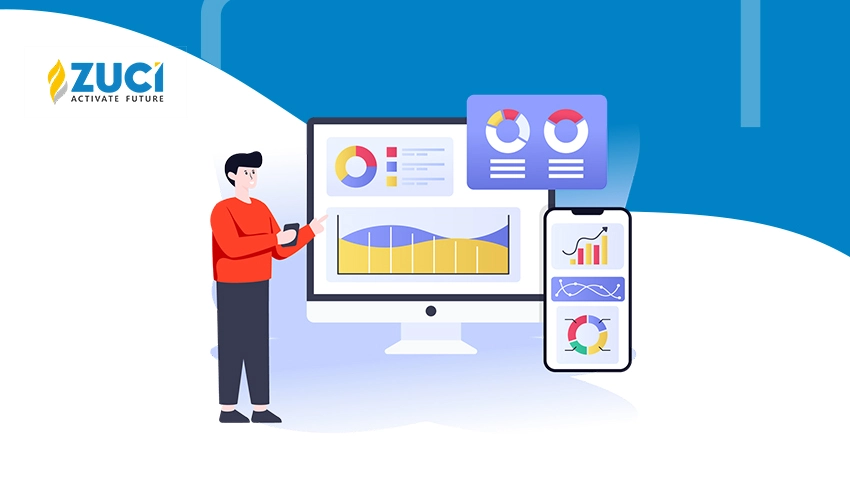Reading Time : 1 Mins
How to Build an Enterprise Data Governance Strategy in an Organization?
I write about fintech, data, and everything around it
Want to be a data-driven organization? Then get your data governance in place. In this article, you will learn what data governance is, the Importance of data governance, why data governance is not optional, best practices for data governance, 7 principles of data governance, and lastly, data governance challenges.
Data governance is a system for defining who has the authority, within an organization, to control data assets, and how they can be used. Data governance includes processes, people, and the technologies that are required to manage and protect the data assets.
Importance of data governance
When there is effective data governance, the chances of finding data inconsistencies across an organization isn’t a problem anymore. For example, account names might be written differently across systems. Something like this can create data integrity issues and affect the accuracy of Business Intelligence (BI) and analytics accuracy.
Find some of the benefits of data governance, below.
- Data will be consistent and uniform across the organization and decision making becomes easier
- There is increased efficiency because of reusing processes and data
- Since there are clear rules for changing processes and data, your business becomes more agile
- Reduces your costs for data management
- Easier to be compliant with data regulations
- The business will be able to get a 360-degree view of critical business entities
- You will be able to understand the location of all data related to key entities
Data governance tools
If your organization is looking for the right data governance approach, then it is imperative that you look for reliable and scalable tools. Make sure that you choose a cloud-based tool and that it has a plug-and-play system. The data governance tool that you select should be based on the business benefits that you want to get out of it.
The data governance tool you choose should help do the following:
- Control your data by actively reviewing and monitoring it
- Understand your data by profiling, discovery, benchmarking tools, etc.
- Validating, data cleansing, and enriching to improve the data quality
- Managing your data effectively so that it is easy to track and trace them
- Increase the searchability, linkability, accessibility, and compliance of the data
Why is data governance not optional?
Organizations these days have incredible amounts of data, not only of their customers, but also of their suppliers, employees, third-party vendors, partners, and so on. If they can make good of the data that is available to them, the business will be able to prosper. When there is data governance, the data within the organization also become trusted, secure, safe, documented, and confidential. It is the duty of the leadership to ensure that your organization is able to maximize data governance investments and minimize the chances of any data breach.
What is Data Governance in Healthcare?
Data governance in healthcare refers to the comprehensive strategy and framework that healthcare organizations put in place to manage, protect, and maximize the value of their data assets. In essence, it is a set of practices, policies, and procedures designed to ensure the high quality, security, and integrity of healthcare data while adhering to regulatory requirements.
Key Components of Data Governance in Healthcare:
- Data Quality Assurance: Data governance involves measures to maintain data accuracy, consistency, and completeness. Data quality checks and validation processes are essential to ensure that healthcare professionals can rely on this data for making informed decisions.
- Data Security and Privacy: Data governance includes strict security measures and access controls to prevent unauthorized access to patient records. Compliance with regulations such as the Health Insurance Portability and Accountability Act (HIPAA) in the United States is crucial, and data governance plays a significant role in achieving and maintaining compliance.
- Data Lifecycle Management: Data governance establishes guidelines for data retention, ensuring that data is retained as long as required by law or best practices and safely disposed of when no longer needed. This reduces the risk of data breaches and minimizes storage costs.
- Metadata Management: Metadata, which provides context and information about the data, is vital in healthcare. Data governance includes the management of metadata, ensuring that healthcare professionals can easily understand and use data. Metadata also helps with data discovery and lineage tracking.
- Data Stewardship: Data governance involves assigning responsibilities for data management to specific individuals or teams within the organization. Data stewards are accountable for data quality and compliance, ensuring that data-related processes are followed diligently.
- Policy Development: Data governance establishes clear policies and procedures related to data handling. These policies encompass data access, sharing, storage, and reporting. They guide employees and stakeholders in adhering to best practices and regulatory requirements.
Why is Data Governance Important in Healthcare?
- Data Integrity: Ensuring the accuracy and consistency of patient data is paramount in healthcare. Data governance establishes processes for data validation, cleansing, and reconciliation, reducing the risk of errors that could lead to misdiagnoses, incorrect treatments, or billing inaccuracies. Reliable data enhances patient safety and the overall quality of care.
- Data Accessibility: In a healthcare ecosystem where timely access to accurate information is critical, data governance ensures that healthcare professionals have the right data at the right time. This improves patient outcomes, streamlines administrative processes, and facilitates coordinated care among multiple providers.
- Data Sharing and Interoperability: In modern healthcare, patient information often needs to be shared across different providers, systems, and institutions. Data governance establishes standards for data sharing and interoperability, ensuring that data can move seamlessly between electronic health record (EHR) systems, laboratories, pharmacies, and other healthcare entities. This promotes continuity of care and reduces duplication of tests and procedures.
- Reducing Data Breach Risks: Healthcare data is a prime target for cyberattacks due to its value on the black market. Data governance includes robust cybersecurity measures, access controls, encryption, and regular security audits to protect patient data from breaches. Preventing data breaches not only safeguards patients but also helps organizations avoid costly fines and legal penalties.
Which Scenario Best Illustrates the Implementation of Data Governance?
Assume a hospital that serves a diverse patient population faces challenges with data quality and consistency, leading to inefficiencies in patient care, billing errors, and potential compliance risks. To address these issues, the hospital decides to implement a comprehensive data governance program. Considering this scenario, the below implementation process can be followed.
Implementation of Data Governance (process):
1) Establishment of Data Governance Committee
2) Data Governance Policies and Procedures
3) Data Stewardship Roles
4) Data Quality Assessment
5) Data Security and Privacy Measures
6) Compliance with Regulations
7) Data Integration and Interoperability
8) Monitoring and Reporting
What is a Data Governance Framework for Organizations?
A data governance framework is a structured and systematic approach that organizations adopt to manage their data effectively and ensure that data-related processes align with the organization’s goals and objectives. It provides a set of guidelines, policies, and procedures to oversee and govern data across the entire data lifecycle. Here are the key elements of a data governance framework:
- Vision and Strategy: Establish a clear vision aligned with organizational goals.
- Governance Structure: Define roles and responsibilities for data governance.
- Policies and Standards: Develop guidelines for data management, security, and compliance.
- Data Quality Management: Ensure data accuracy, completeness, and reliability.
- Metadata Management: Capture and use metadata for data context and lineage.
- Data Classification and Handling: Categorize data based on sensitivity and handling procedures.
- Data Security and Access Controls: Implement security measures and access controls.
- Data Privacy Compliance: Align with data privacy regulations and manage consent.
- Data Lifecycle Management: Define processes for data creation, storage, and disposal.
- Data Governance Tools and Technology: Deploy tools for data governance support.
- Monitoring and Enforcement: Monitor compliance and enforce policies.
- Data Governance Education and Training: Provide training resources for stakeholders.
- Continuous Improvement: Foster a culture of ongoing enhancement in data governance practices.
How Does Data Governance Differ from Data Management for Organizations?
While both play crucial roles in managing data effectively, they serve different purposes and address different aspects of the data lifecycle. Data management primarily deals with the technical and operational aspects of data, focusing on processes, storage, and retrieval. In contrast, data governance takes a strategic approach, establishing policies and standards to ensure data quality, security, privacy, and compliance with regulatory requirements. To provide a clearer understanding of their differences, here’s a comparison between data governance and data management in a tabular format:
| Aspect | Data Management | Data Governance |
| Focus | Processes and Technical Aspects | Strategy and Policy |
| Operational Nature | Operational | Strategic and Holistic |
| Primary Functions | Data handling, storage, retrieval | Policy establishment, oversight |
| Data Handling | Granular (e.g., data processing) | Strategic (e.g., data quality) |
| Data Storage and Retrieval | Efficient storage and retrieval | Policy and decision-making |
| Tools and Infrastructure | Data tools and infrastructure | Policies and standards |
| Responsibility | IT, database administrators | Data owners, governance committee |
| Data Quality and Consistency | Data accuracy and consistency | High-quality, aligned with goals |
How to Implement Data Governance in an Organization?
Data governance provides the structure and guidelines necessary to manage data effectively throughout its lifecycle. In this step-by-step guide, we will walk you through the process of implementing data governance in your organization. Whether you are just starting your data governance journey or looking to enhance your existing framework, these steps will help you establish a solid foundation for establishing an enterprise data Governance strategy in your organization.
Step 1: Define Your Objectives and Goals
Begin by clearly defining the objectives and goals of your data governance initiative. What specific challenges are you aiming to address? Are you looking to improve data quality, enhance data security, ensure regulatory compliance, or all of the above? Having well-defined objectives will guide the entire implementation process.
Step 2: Secure Executive Support
Data governance requires support and commitment from the top levels of your organization. Seek buy-in from senior executives and stakeholders who can champion the initiative, allocate resources, and ensure that data governance becomes a priority.
Step 3: Assemble a Data Governance Team
Form a dedicated data governance team or committee comprising individuals from different departments, including IT, compliance, legal, and business units. Appoint a data governance leader who will oversee the initiative and ensure that data governance policies are implemented effectively.
Step 4: Inventory Your Data Assets
Conduct a thorough inventory of your organization’s data assets. Identify the types of data you collect, store, and use, as well as where this data resides. This step is essential for understanding the scope of your data governance efforts.
Step 5: Assess Data Quality
Evaluate the quality of your data. Identify data quality issues, such as inaccuracies, incompleteness, and inconsistencies. Implement data profiling and data quality assessments to get a clear picture of your data’s current state.
Step 6: Develop Data Governance Policies and Standards
Create a comprehensive set of data governance policies and standards that address data quality, data security, data privacy, compliance, data ownership, and other relevant aspects. Ensure that these policies align with your organizational goals and objectives.
Step 7: Assign Data Stewards
Assign data stewards or data custodians for specific data domains or business units. These individuals are responsible for the quality and management of data within their respective areas.
Step 8: Implement Data Governance Tools and Technology
Choose and deploy data governance tools and technology that support your data governance framework. These tools may include data cataloging, data lineage, data quality, and data security solutions.
Step 9: Communicate and Educate
Communication is key to successful data governance adoption. Conduct training sessions and awareness programs for employees to ensure they understand the importance of data governance and their roles within the initiative.
Step 10: Establish Data Governance Processes
Define data governance processes for data classification, data access requests, data quality checks, and data incident response. Ensure that these processes are documented and integrated into your organization’s workflows.
Best practices for data governance
While every organization is different, you do need to follow some of the best practices to ensure that your business has a smooth data governance journey.
- Do not go all in. Strive for small victories.
- Ensure that you have specific, measurable, achievable, and realistic goals.
- Define the ownership of the data governance responsibilities. If there is no one to handle the issues, then the data governance framework cannot succeed.
- The data governance framework should be adapted into how you conduct your business.
- Make sure that you map your infrastructure, architecture, and goals. Your company’s data governance framework should be a part of your IT landscape and enterprise architecture.
- Get the buy-in from key stakeholders.
- Speak about the data governance framework in simple business terms so that it is easy to understand what it entails
- Focus on the most critical data elements after identifying them.
- Identify use cases related to your cost savings, growth, etc.
- Focus on data quality KPIs and integrate it with your performance KPIs
Seven principles of data governance
In 2020, Gartner identified seven principles that you need to follow for data governance. Let us look at each one of them:
1. Value and outcomes
Your data governance should be aligned with your business outcomes. To measure the progress, you need a strong data analytics setup in place.
2. Trust
Is it possible for you to trust all your data sources? Is the data under your control throughout its lifetime? If you want a distributed data system, your data governance should be built on a model of trust. It is imperative that you know where the data comes from so that expectations can be managed.
3. Accountability and Decision rights
Ensure that your team is accepting of your data governance strategy. All the stakeholders should be made accountable for your data. You need to define who can make decisions about the data.
4. Transparency and ethics
The data analytics on your data governance should be transparent. There should be a well-established decision-making process so that even a 3rd-party audit should not find any faults.
5. Education and training
Train data owners and other stakeholders on the principles of data governance. Make sure that you have a well-defined training program to make sure data governance is in place.
6. Risk and security
Businesses engage in data governance to manage risk and security issues that might crop up because of data.
7. Collaboration and culture
How are different departments going to operate together so that they can keep the data safe?
By focusing on these seven areas, you will be able to accomplish your data governance goals and refine your data governance operational methodology.
Data governance challenges
When you put a data governance plan in place, you will come across a variety of challenges that you need to face head-on. Let us look at each of them.
1. Data silos
One of the biggest problems with data governance is that different departments do not share their data with each of them. This happens often because datasets are not available for each of them. The teams might not even know about the kind of data that other teams have. There is such a disconnect that it leads to inconsistencies across data sets and creates more problems.
2. Lack of trust
To get actionable insights from your analytics engine, the data quality should be superior. The data in your system should be reliable and consistent, which is what will build trust. When there is distrust of data, they will not trust the results from the analytics.
3. Lack of leadership
To execute new standards and policies, there should be immense support from the leadership. There are many organizations that do not have a Chief Data Officer (CDO) to manage their information. When a data governance structure is being developed, each and every implementation process should be reviewed thoroughly so that the structure, delivery, and policies are clear.
4. Lack of resources
More often than not, data governance is an afterthought for most companies. Finding the resources or necessary budget for it is usually more difficult than normal. Many organizations assume that data is the responsibility of the IT department. IT cannot manage all the data, and they certainly cannot be solely responsible for data governance.
5. Lack of control
One of the most common data governance challenges is the lack of control over data. When there is no control over data, it can result in non-compliance. The reason why laws such as HIPAA, GDPR, PCI-DSS, and CCPA have been put in place is to regulate how sensitive data is handled. Businesses that do not follow them strictly will be met with severe punishments.
Conclusion
All organizations out there should have a clear-cut strategy on how to handle their data, and it starts with having a data governance strategy in place. When data is consistently handled with care, it will give you solid business outcomes. Organizations that ensure security and compliance of their data, stand to extract value from all that is collected, and it will reflect in their business’ success too.
So, whether you are an SME or enterprise company, data tracking is the key to the success of your business. Schedule a 30-minute call and learn about Zuci’s Data Engineering Services to craft a single source of truth system for real-time data analytics, business reporting, optimization, and analysis.
If you want to make sense of your data while being compliant with all the data regulation laws, we would be more than happy to help your organization achieve that. Get on a call with the data governance experts at Zuci.
Related Posts





















